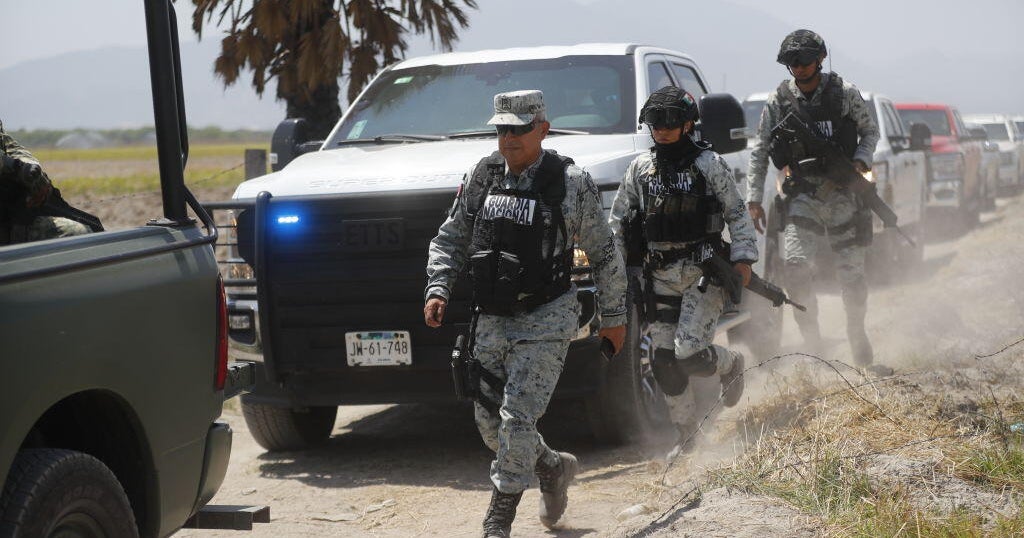In a significant development highlighting ongoing issues with drug cartel violence in Mexico, the mayor of the western town of Teuchitlán, José Murguía Santiago, has been arrested. This comes amid investigations into a suspected training camp for the Jalisco New Generation cartel, where human remains and clothing have been discovered. The arrest marks a notable escalation in efforts to root out corruption and complicity among local officials linked to organized crime.
| Article Subheadings |
|---|
| 1) Background of the Jalisco New Generation Cartel |
| 2) The Discovery of the Izaguirre Ranch |
| 3) The Allegations Against Mayor Murguía |
| 4) Reactions from Authorities and Human Rights Groups |
| 5) Implications for Local and National Security |
Background of the Jalisco New Generation Cartel
The Jalisco New Generation cartel (CJNG) has emerged as one of the most powerful and violent drug trafficking organizations in Mexico. Formed in the early 2010s, the cartel quickly rose to prominence following its separation from the Sinaloa cartel, especially after the death of notorious drug lord Ignacio “Nacho” Coronel Villarreal in 2010. The CJNG is known for its ruthless tactics and has attracted thousands of recruits, with estimates from the U.S. Drug Enforcement Administration suggesting that the cartel has around 19,000 members. Its rapid expansion and willingness to engage in extreme violence have raised alarm both locally and internationally.
The Discovery of the Izaguirre Ranch
The Izaguirre Ranch, located in Teuchitlán, Jalisco, was first identified in September 2024 as a potential training ground for CJNG. Subsequently, extensive searches led to the uncovering of human bones and scattered clothing within the premises. This site, which has been labeled as the “ranch of horror” by local media, prompted renewed scrutiny into official investigations following the discovery of additional human remains by a collective known as Guerreros Buscadores, dedicated to locating missing persons.
The Allegations Against Mayor Murguía
The arrest of José Murguía Santiago is primarily rooted in charges of complicity but also encompasses allegations of neglecting duties that allowed criminal activities to flourish in the area. Officials have expressed concerns that local authorities may have been involved in harboring or enabling cartel operations. Murguía’s arrest, alongside around a dozen other police officials, signifies an attempt to dismantle potential corruption within local governance that obstructs law enforcement efforts against organized crime.
Reactions from Authorities and Human Rights Groups
The Mexican government has faced intense scrutiny regarding its handling of crime and missing persons cases, particularly in states like Jalisco, which has the highest number of reported missing individuals—over 15,000—since the war on drugs began in 2006. Human Rights Watch has characterized the Izaguirre Ranch as an “apparent mass killing site,” raising concerns about the government’s perceived failure to protect its citizens. Security Minister Omar Garcia Harfuch has also stated there is no evident proof linking the ranch to mass killings despite mentioning testimonies of torture and execution of recruits who attempted to escape.
Implications for Local and National Security
The impact of these events extends beyond Teuchitlán, reflecting broader concerns regarding public safety and governance in Mexico. The CJNG’s ability to infiltrate local authorities poses serious challenges to national security and public trust in governmental institutions. The high number of missing persons highlights the urgent need for comprehensive reforms in both law enforcement and judicial processes to tackle the entrenched issues of corruption and violence.
| No. | Key Points |
|---|---|
| 1 | Mayor José Murguía Santiago of Teuchitlán was arrested amid a probe into cartel activities. |
| 2 | The Izaguirre Ranch has been linked to training and potential mass killings by the Jalisco New Generation cartel. |
| 3 | Over 15,000 people are missing in Jalisco, underscoring ongoing issues with violence and corruption. |
| 4 | Human Rights Watch has raised alarms about the ranch’s role as a possible extrajudicial execution site. |
| 5 | The investigation aims to dismantle deep-rooted corruption among local officials affiliated with drug cartels. |
Summary
The arrest of José Murguía Santiago, the mayor of Teuchitlán, amid an investigation into the Jalisco New Generation cartel underscores the challenges Mexico faces in addressing the pervasive influence of organized crime. As details about the Izaguirre Ranch emerge, numerous questions about the effectiveness of local and national law enforcement remain. The situation calls for a reaffirmed commitment to safeguarding citizens’ rights and restoring public trust in government institutions.
Frequently Asked Questions
Question: What is the Jalisco New Generation cartel?
The Jalisco New Generation cartel is a powerful and violent drug trafficking organization based in Mexico, having broken away from the Sinaloa cartel.
Question: What was discovered at the Izaguirre Ranch?
Authorities found human remains, clothing, and other belongings at the ranch, leading to allegations of its use as a training camp for cartel recruits.
Question: How has the Mexican government responded to violence associated with drug cartels?
The Mexican government has faced criticism for its handling of crime, leading to calls for reforms and a more robust approach to dismantling cartel operations and addressing corruption.


